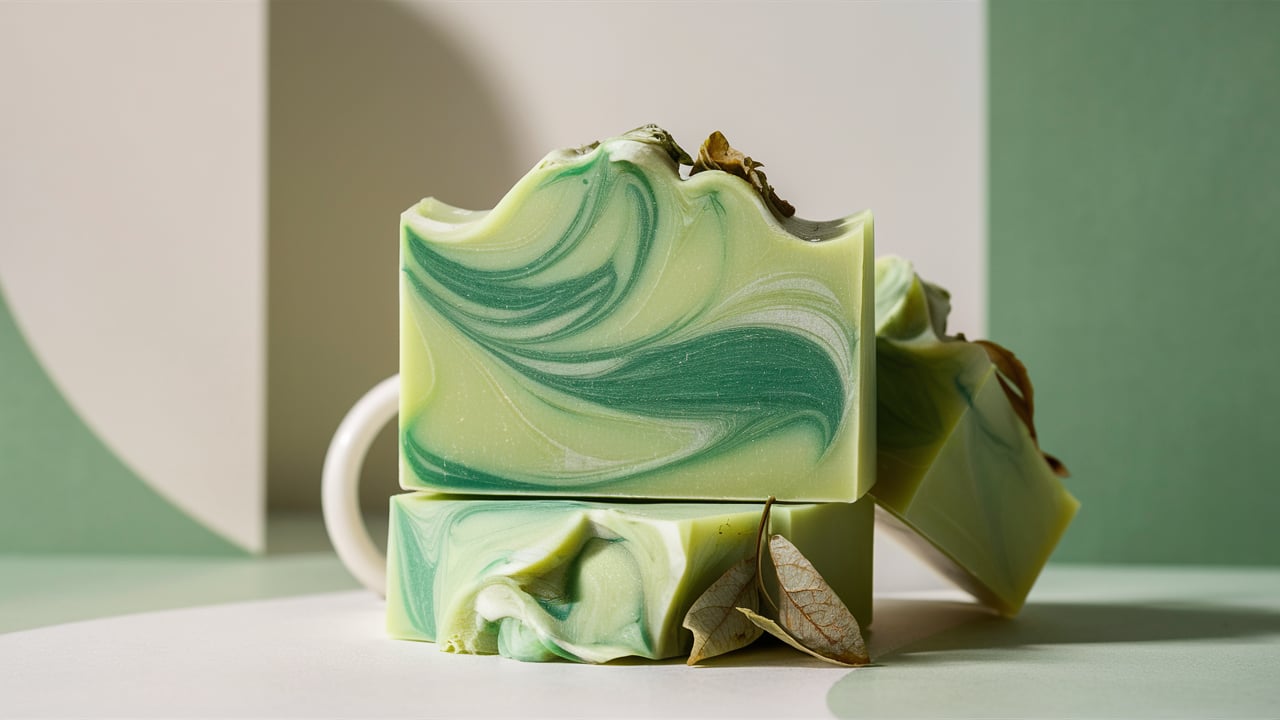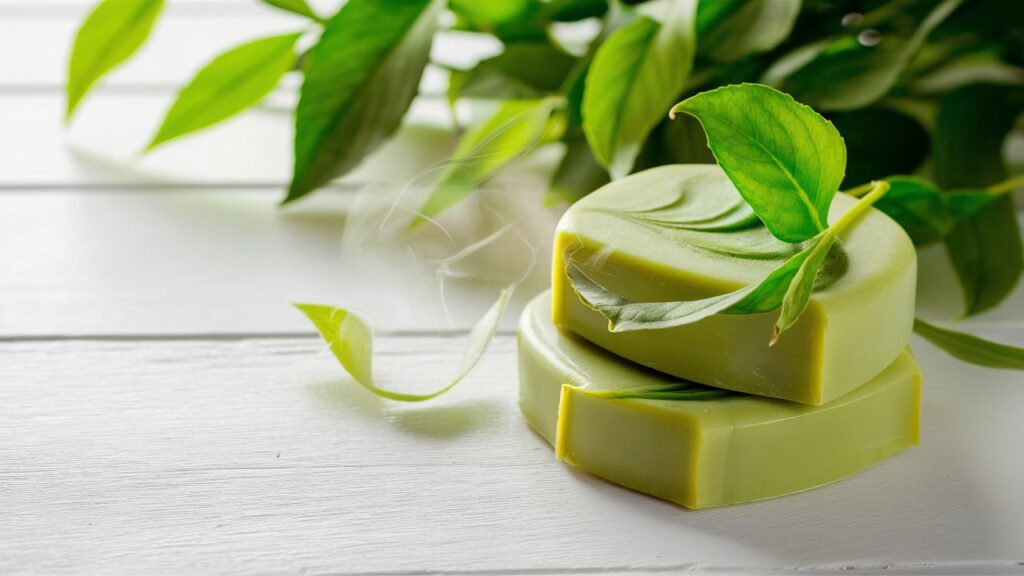At a glance: This article explores how green tea’s natural antioxidants and anti-inflammatory properties can improve your skin’s health, fight acne, reduce signs of aging, and give you a radiant complexion. Discover why green tea soap should be your next beauty staple.
The use of green tea in skincare has a long and rich history, tracing its roots back thousands of years to Asia.
Evidence suggests that green tea’s medicinal properties were recognized in China as early as 4,000 years ago. Green tea was likely used not just as a beverage but also in topical applications for skin health.
In recent decades, scientific research has validated many of the traditional beliefs about green tea. Studies have confirmed its antioxidant and anti-inflammatory properties, making it a valuable ingredient in skincare products.
Soap Secrets: Why Homemade Soaps Are Your Skin’s New Best Friend
Key Ingredients in Green Tea Soap
Green tea soap typically combines two main categories of ingredients:
Green Tea Leaves (Powdered or Whole):
These can be used in two ways. Finely ground leaves may be incorporated into the soap for exfoliation and visual interest. Whole or roughly ground leaves are often steeped to create a green tea infusion.
Soap Base:
Common options include olive oil, coconut oil, shea butter, and cocoa butter. The specific oils used can influence the soap’s lather, texture, and moisturizing properties.
Optional Ingredients:
- Essential Oils: These can be added for fragrance and potential skin benefits. Popular choices for green tea soap include lemongrass, lavender, or peppermint.
- Colorants: Natural pigments or mica powder can be used to enhance the soap’s visual appeal.
Note: Commercially produced green tea soap may not contain actual green tea leaves. Fragrance oils and colorants can be used to mimic the scent and appearance of green tea.
Antioxidant Properties
Green tea boasts a rich concentration of antioxidants, particularly polyphenols called catechins. The most prominent catechin is epigallocatechin gallate (EGCG). These antioxidants are well-known for their ability to neutralize free radicals.
Free Radicals may cause cellular damage, contributing to premature aging and wrinkles. Green tea soap contains antioxidants that help fight free radicals.
The soap-making process can be harsh, potentially degrading some of the green tea’s antioxidants. However, if the soap uses methods like steeping green tea to create an infusion, some of these antioxidants may be preserved.
When applied topically, antioxidants in green tea soap might help neutralize free radicals on the skin’s surface.
Moisturizing and Hydration
While green tea itself isn’t a direct moisturizer, it possesses properties that can indirectly contribute to skin hydration:
Green tea’s anti-inflammatory properties, thanks to polyphenols like EGCG, can be beneficial for dry skin. Inflammation disrupts the skin’s barrier function, leading to increased water loss. By reducing inflammation, green tea may help the skin retain moisture more effectively.
Dry skin can be itchy and irritated. Green tea’s anti-inflammatory properties can soothe irritation and discomfort, promoting a more comfortable feeling.

Anti-Aging Effects
Green tea’s anti-aging effects stem from its potent antioxidant properties and other beneficial compounds.
Green tea is rich in antioxidants, particularly polyphenols called catechins. The most prominent catechin is epigallocatechin gallate (EGCG). These antioxidants combat free radicals – unstable molecules that damage cells and contribute to aging. Green tea neutralises free radicals and protect the skin from premature aging and wrinkles.
Green tea may also promote healthier skin in several ways:
Collagen Production: Some studies suggest green tea extracts might stimulate collagen production. Collagen is a protein that plumps and supports the skin, contributing to a youthful appearance.
Enhanced Skin Elasticity: Green tea’s anti-inflammatory properties may help maintain skin elasticity.
Acne Prevention and Treatment
Green tea soap might play a role in acne prevention and treatment, but the evidence is not conclusive.
Green tea contains polyphenols, particularly EGCG, which exhibit some antibacterial properties. These properties could potentially help reduce acne-causing bacteria like Propionibacterium acnes (P. acnes).
The tea’s anti-inflammatory properties may help soothe redness and irritation associated with acne breakouts.
Some studies suggest green tea might help regulate sebum (oil) production. Excessive sebum can clog pores and contribute to acne formation.
User Experiences
According to a thread on acne.org, users reported positive outcomes using green tea for acne. Some testified having clearer skin when drinking 2-3 cups daily or applying it topically ➊.
Green tea enthusiasts also noted that green tea’s antioxidant properties help reduce sebum production and inflammation➌.
Detoxifying Properties
Green tea soap might offer some benefits that indirectly contribute to a clearer, healthier-looking complexion.
The soap acts as a gentle cleanser, removing dirt, oil, and impurities from the skin’s surface. It can help prevent clogged pores and breakouts, leading to a clearer appearance.
As mentioned earlier, green tea contains polyphenols like EGCG with some antibacterial properties. These properties might help reduce acne-causing bacteria on the skin’s surface.
The primary benefit of green tea in soap making lies in its cleansing properties. Green tea removes surface dirt and oil, promoting a more refreshed appearance.
Suitability for Different Skin Types
Green tea is generally non-irritating and doesn’t contain harsh ingredients that can strip away natural oils. This makes it a good option for people with sensitive skin.
As discussed earlier, there are several benefits of green tea soap on face:
- Anti-inflammatory effects might soothe irritation for sensitive skin.
- Potential for sebum regulation could benefit oily skin.
- Antioxidant properties might offer some anti-aging benefits for mature skin.
Customizable Ingredients
Green tea soap can be formulated with additional ingredients to cater to specific needs. For example:
Moisturizing butters (shea butter, cocoa butter) can be added for dry skin.
Exfoliating ingredients (oatmeal, ground almonds) might be suitable for oily or combination skin.
Personal Testimonials and Case Studies
Teen’s success with cystic acne:
A teen named Hilda Paz Robles posted before-and-after photos of her cystic acne clearing up after drinking green tea and honey three times a week. ➋.
Robles also used a homemade face mask with green tea and raw honey along with a charcoal bar cleanser and a moisturizing cream to help clear her acne.
30-day matcha green tea experiment:
The article details a 30-day matcha challenge. The author shares personal experiences with daily matcha consumption. She recorded increased caloric burn during workouts, improved mood, and positive effects on skin and hair health.
Acne and inflammation reduction:
Green tea’s anti-inflammatory properties helped a Reddit user reduce acne and skin redness.
How to Choose the Best Green Tea Soap
Here are some tips to help you choose the best green tea soap for your skin:
Consider Your Skin Type:
Dry Skin: Look for soaps with added moisturizing ingredients like shea butter, cocoa butter, or olive oil.
Oily Skin: Choose a soap that doesn’t contain additional oils and avoid harsh ingredients that can strip natural oils and worsen oiliness.
Sensitive Skin: Opt for fragrance-free soap and patch test it on a small area before using it all over.
Combination Skin: You might still benefit from green tea soap, but monitor your skin’s reaction and adjust your routine as needed.
Look for Quality Ingredients:
Ideally, the soap should contain actual green tea leaves (powdered or whole) or be made with a green tea infusion.
Avoid soaps with harsh detergents or sulfates that can be drying or irritating.
Soaps made with natural oils and butters are generally gentler on the skin.
Read online reviews from people with similar skin types to get their experiences with different green tea soaps.
Remember: There’s no single “best” green tea soap. The best choice depends on your individual skin type and needs.
Frequently Asked Questions
What are the benefits of green tea in soap?
There are multiple green tea soap benefits, including reducing skin inflammation, improving complexion, and fighting signs of aging.
Is green tea soap suitable for all skin types?
Yes, green tea soap is generally gentle and suitable for all skin types, including sensitive skin. However, it is always recommended to do a patch test before full usage.
Does green tea soap help with acne?
Green tea soap can help with acne due to its antibacterial properties that can target acne-causing bacteria and reduce inflammation.
How often should I use green tea soap?
You can use green tea soap daily as part of your skincare routine, preferably during your morning and evening face wash.
Can green tea soap help with reducing dark circles?
Green tea soap’s antioxidant properties can help in reducing dark circles by promoting blood circulation and soothing the delicate skin around the eyes.
Is green tea soap eco-friendly?
Green tea soap made from natural ingredients can be eco-friendly, especially if it is packaged in biodegradable or recyclable materials.
Does green tea soap have a strong scent of tea?
The scent of green tea soap can vary depending on the brand and additional fragrances used. Some may have a subtle tea scent, while others may have added fragrances for a more aromatic experience.
Can green tea soap help in skin whitening?
Green tea soap may help with brightening the skin tone over time, but it is not specifically meant for skin whitening. Consistent use can lead to a more radiant complexion.
Is green tea soap suitable for children as well?
Green tea soap can be used by children, but it’s essential to ensure that the ingredients are safe for their delicate skin and that they do not have any allergies to the components.
Can green tea soap be used on the body as well as the face?
Yes, green tea soap can be used on both the body and face. It provides the same benefits for the skin, irrespective of the area where it is applied.
Bottom Line
Green tea soap is a versatile and beneficial addition to any skincare routine. Whether you’re dealing with acne, signs of aging, or simply want to enhance your skin’s natural glow, green tea soap can be a game-changer.
Ready to experience the amazing benefits of green tea soap for yourself? Try incorporating it into your daily skincare regimen and see the difference it can make.
Sources:
https://www.mdpi.com/2079-9284/9/5/96
https://www.ncbi.nlm.nih.gov/pmc/articles/PMC9370301/

I’m a devoted organic skincare enthusiast, passionate about the natural, wholesome goodness that organic products bring to our skin.
Organic skincare isn’t just a hobby for me—it’s a lifestyle. Every product I use, recommend, and write about has been carefully chosen for its purity and effectiveness. Everything I write about is backed by scientific studies, dermatologists’ opinions, and user experiences.
I also excel at tackling skincare challenges with innovative, organic solutions.

